Chinese Journal of Tissue Engineering Research ›› 2013, Vol. 17 ›› Issue (8): 1497-1504.doi: 10.3969/j.issn.2095-4344.2013.08.027
Previous Articles Next Articles
Targeting effect and application of liver cancer targeting vector drugs
He Er-xia1, Nie Zhong-shi2, Zhang Ying-hui1, Lin Hai-feng1
- 1 Department of Medical Oncology, Hainan Provincial Nong Ken Hospital, Haikou 570311, Hainan Province, China
2 Department of Radiology, Hainan Provincial Nong Ken Hospital, Haikou 570311, Hainan Province, China
-
Received:2012-09-18Revised:2012-11-27Online:2013-02-19Published:2013-02-19 -
Contact:Lin Hai-feng, Chief physician, Department of Medical Oncology, Hainan Provincial Nong Ken Hospital, Haikou 570311, Hainan Province, China niezhongshi@163.com -
About author:He Er-xia★, Master, Associate chief physician, Department of Medical Oncology, Hainan Provincial Nong Ken Hospital, Haikou 570311, Hainan Province, China heerxia@163.com
CLC Number:
Cite this article
He Er-xia, Nie Zhong-shi, Zhang Ying-hui, Lin Hai-feng. Targeting effect and application of liver cancer targeting vector drugs[J]. Chinese Journal of Tissue Engineering Research, 2013, 17(8): 1497-1504.
share this article
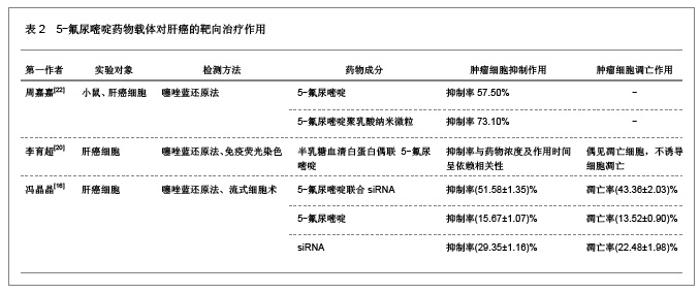
2.1 5-氟尿嘧啶药物载体对肝癌的靶向治疗作用 5-氟尿嘧啶是临床上常用的抗代谢类抗肿瘤类药物,血浆半衰期仅为10-20 min,治疗剂量和中毒剂量接近。为了达到较好的治疗效果,会增加5-氟尿嘧啶的应用剂量,而大剂量应用5-氟尿嘧啶会增加药物的毒副作用,不仅抑制了肝脏肿瘤的生长,同时也损伤了正常组织和细胞的结构和功能。因此,应用时多采用5-氟尿嘧啶药物载体缓释系统,以减轻5-氟尿嘧啶的毒副作用,延长药物与肿瘤组织的作用时间,提高药物的治疗效果,减轻患者的痛苦。 5-氟尿嘧啶及其药物载体缓释系统均有较好的靶向治疗肝癌的作用,而5-氟尿嘧啶载体缓释系统对肝癌的靶向治疗作用效果更好。周嘉嘉等[22]、李育超等[20]和冯晶晶等[16]分别对5-氟尿嘧啶及其药物载体缓释系统靶向治疗肝癌的作用进行了实验研究分析,应用噻唑蓝还原比色以及免疫荧光染色等生化检测方法,分析药物对肿瘤的抑制和杀伤作用,明确5-氟尿嘧啶及其药物载体缓释系统靶向治疗肝癌的效果,具体研究方法及结果见表2。"
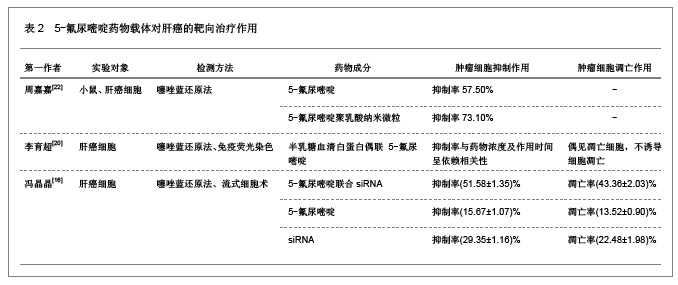
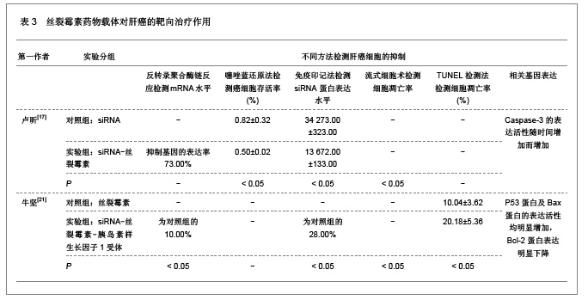
上述3组实验研究发现无论是5-氟尿嘧啶及其药物载体缓释系统,还是5-氟尿嘧啶联合半乳糖血清白蛋白以及联合siRNA均能够靶向性抑制肝癌细胞,达到靶向治疗肝癌的作用,而其药物载体缓释系统以及偶联化合物可以提高肝癌细胞的抑制率,具有更好靶向治疗肝癌的效果。 彭健等[19]对5-氟尿嘧啶治疗肝癌时各器官的药物浓度进行了研究分析,发现肝脏肿瘤内的药物浓度水平最高,其次是正常肝组织内药物浓度,其它心、肾以及血浆等内的5-氟尿嘧啶药物浓度水平均相对较低。可见5-氟尿嘧啶对肝癌不仅有治疗作用,而且还能够发挥靶向性治疗的作用效果,明显提高治疗效果。 2.2 丝裂霉素药物载体对肝癌的靶向治疗作用 丝裂霉素是一种广谱抗肿瘤药物,属于细胞周期非特异性药物,固体状态时性质稳定,在酸性和碱性溶液中容易失去活性,易溶于水、甲醇和丙酮等有机溶剂,微溶于苯、乙醚和四氯化碳,不溶于石油醚。静脉注射时初始相半衰期为17 min,终止相半衰期为50 min,经肝脏代谢,肾脏排出体外。丝裂霉素及其偶联物均有较好的抗肿瘤作用,对肝癌靶向治疗作用的研究分析见表3。"
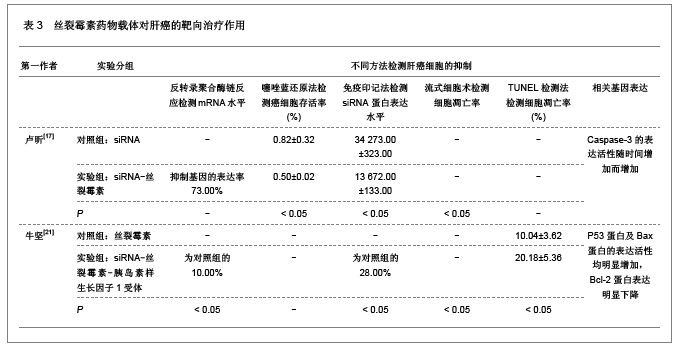
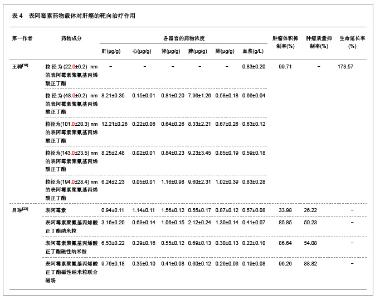
通过研究分析可以看出丝裂霉素及其偶联物均有抑制肝癌细胞,靶向治疗肝癌的作用,靶向survivin的siRNA既可以有效抑制肝癌细胞中survivin的表达,也可以通过增强细胞内caspase-3活性增强肝癌细胞对丝裂霉素的敏感性,导致肝癌细胞的凋亡而发挥靶向治疗作用。而siRNA-丝裂霉素-胰岛素样生长因子1受体具有RNA干扰作用,并能增强丝裂霉素诱导细胞凋亡而发挥治疗作用。 任非等[24]研究分析了丝裂霉素靶向治疗肝癌的肿瘤质量抑制率,结果显示丝裂霉素对肝癌的抑制率可达27.6%,而丝裂霉素聚氰基丙烯酸正丁酯胶体溶液对肝癌的抑制率为54.0%,而丝裂霉素聚氰基丙烯酸正丁酯胶体溶液联合外加磁场后对肝癌的抑制率可达88.6%。表明丝裂霉素不仅对肝癌有癌细胞抑制作用,而且其共聚化合物对肝癌细胞的抑制作用更明显。 2.3 表阿霉素药物载体对肝癌的靶向治疗作用 表阿霉素是临床常用的抗肿瘤药物之一,王骋[18]和吕琳[23]分别对表阿霉素靶向治疗肝癌的作用进行了研究分析,研究结果见表4"
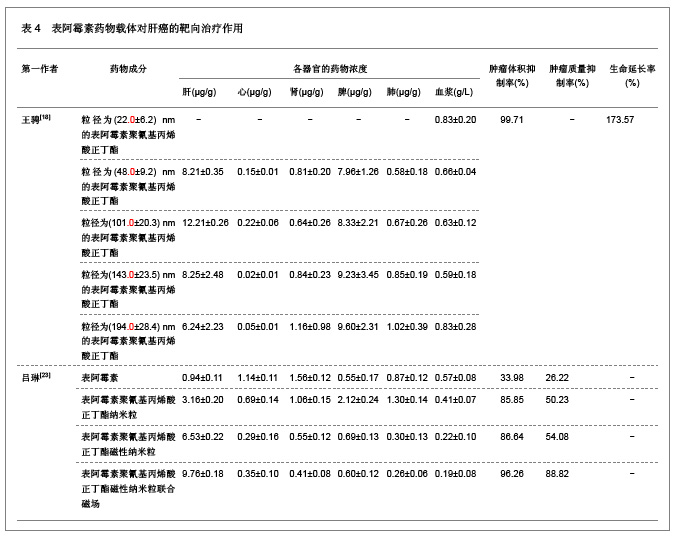

2.4 5-氟尿嘧啶、丝裂霉素和表阿霉素对肝癌靶向治疗的临床应用 病例来源:2008年6月至2011年6月海南省农垦总医院肿瘤内科共有163例中晚期肝癌患者,其中男139例,女24例,年龄28-84岁,平均60岁。所有患者均按照2001版“原发性肝癌的临床诊断与分期标准[25]”明确诊断为中晚期肝癌,并予行导管动脉化疗栓塞治疗。 临床表现:患者的临床表现主要为上腹部不适、腹胀、食欲不振及肝区疼痛,部分患者出现黄疸。Child-Pugh分级[26]A级60例,B级92例,C级11例。影像学表现巨块型113例(部分合并肝内子灶),弥漫型24例,结节型26例。乙型肝炎病毒标记物1项或1项以上阳性143例。甲胎蛋白阳性者131例,水平在52-6 000 μg/L。 检查方法:所有患者均在64排螺旋CT下行三期增强扫描,扫描范围为膈顶至肾下极。采用层厚 5 mm,层间距5 mm进行螺旋扫描,延迟时间为肝动脉期25 s,门静脉期60 s,延迟期180 s,扫描完成后把动脉期采集的原始数据行0.625 mm薄层重建后传至AW4.3工作站进行肝癌供血动脉CT血管造影,重建方法为最大密度投影及容积再现,重点显示腹腔动脉、肝动脉及肿瘤血管,并根据肿瘤生长部位及周围累及情况,选择性重建肠系膜上动脉、膈动脉、胃左动脉、胃右动脉、脾动脉、右肾动脉、右肾上腺下动脉、胸廓内动脉、右侧肋间动脉、右侧腹壁上动脉及网膜动脉分支等,明确肿瘤所有供血动脉的条数、走行及相互吻合情况。 治疗方法:在Sias型C臂下进行导管动脉化疗栓塞治疗,采用Seldinger穿刺技术行股动脉穿刺插管,根据肝癌供血动脉CT血管造影重建肿瘤供血动脉情况选用不同型号的导管,先行肝动脉造影,进一步确认肿瘤供血情况,对于多条供血动脉的肝癌尽可能把所有供血动脉全部栓塞,化疗药物选用5-氟尿嘧啶、丝裂霉素、栓塞剂为表阿霉素与40%碘化油混合乳化剂。经造影确认栓塞满意后,结束治疗。 效果评估:治疗后要求患者每30 d返院系统复查1次并根据复查结果制定个体化治疗方案,复查结果按WHO实体瘤客观疗效评定标准[27],分为完全缓解,部分缓解,无变化,进展,并统计近期(治疗3个月)客观有效率;所有患者均至少随访1年以上,统计1年生存率。 影像学检查结果及治疗情况: 供血动脉变异情况:肝癌供血动脉CT血管造影显示有56例共69支肝外血管参与肿瘤供血,其中右膈动脉42支,胃左动脉7支,右肾上腺下动脉5支,胃右动脉4支,网膜动脉分支、胸廓内动脉及左膈动脉各3支,右侧腹壁上动脉1支,脾动脉1支。肝动脉起源变异25例,其中肝副左动脉起源于胃左动脉16支,肝副右动脉或替代肝右动脉起源于肠系膜上动脉9支。 治疗情况:所有病例行导管动脉化疗栓塞术治疗次数为1-6次,平均3次;11例患者治疗后1个月复查CT血管造影提示原供血动脉栓塞较满意,但新出现右膈动脉参与肿瘤供血,随后行右膈动脉导管动脉化疗栓塞术治疗,随访13-27个月,其中有9例患者肿瘤控制较满意。 治疗效果: 近期疗效:163例患者治疗3个月后复查CT增强扫描,并与治疗前比较,结果完全缓解3例,部分缓解126例,无变化23例,进展11例,无死亡病例,近期客观有效率79%。87%的患者生活质量有不同程度的改善。 1年生存率:163例患者至少随访1年,其中7例失访,其余156例均有详细随访记录,统计1年生存率为65.3%。 临床应用体会: 在导管动脉化疗栓塞治疗前行肝癌供血动脉CT血管造影的意义:为了尽可能彻底地栓塞肝癌所有供血动脉,介入治疗中,除常规行腹腔动脉、肠系膜上动脉造影外,常要扩大血管造影范围,为减少漏栓,部分学者推荐标准的血管造影的程序是:腹主动脉造影→腹腔动脉造影→肠系膜上动脉造影→选择性肝动脉造影;肠系膜上动脉→腹腔动脉→肝总动脉造影。但无论何种程序,操作均耗时,对比剂用量大,并且增加医患接受辐射剂量[28]。 治疗中充分发挥64层螺旋CT强大的软硬件及后处理功能:利用患者行肝脏CT增强扫描后的数据,在不增加患者射线量及经济负担的前提下利用软件重建肝癌的所有供血动脉,图像立体感强,并可多方位旋转、多角度观察,清晰显示肝癌供血动脉的起源与走行,还可添加胸椎和腰椎等标志性背景作为寻找肝癌供血动脉开口标志,进而指导栓塞治疗时导管的选择及介入治疗,可直观地了解肿瘤的供血及侧支血管的来源及解剖关系,从而可减少造影次数,减少对比剂用量,缩短手术时间,降低医患辐射剂量,提高介入治疗效果。 导管动脉化疗栓塞治疗的效果:肝癌的血供85%-90%来源于肝动脉[29],而正常肝组织的血供来自肝动脉的较少,70%-75%由门静脉供应,所以栓塞肝动脉可以有效阻断肿瘤的血供,而对正常肝组织影响较小,并且经动脉注入化疗药物,增加了肿瘤部位的药物浓度,治疗效果更加明显,同时减少了患者全身的毒副作用。大量文献报道经过导管动脉化疗栓塞参与的综合治疗,患者的生存期及生存质量均有了明显提高和改善[30-34]。 文章分析中发现,同样是中晚期肝癌患者,他们在接受导管动脉化疗栓塞治疗后生存期的差别很大,而肝动脉解剖变异多、肝脏多源血供、门静脉供血以及肿瘤侧支循环等原因是导致复发率高、远期疗效不满意的主要原因[35]。因此,在肝动脉化疗栓塞治疗中,应熟悉肝动脉的解剖与变异,积极寻找靶动脉,尽可能超选择插管施行栓塞治疗,以获得良好的疗效。文章研究中163例患者行肝癌供血动脉CT血管造影显示有56例共69支肝外血管参与肿瘤供血,肝动脉起源变异25例,均得到数字减影血管造影显示证实,符合率为100%。 化疗药物的应用:5-氟尿嘧啶、丝裂霉素以及表阿霉素都是临床常用的抗肿瘤药物,都可以通过抑制或杀灭肝癌细胞发挥对肝癌的治疗作用,而且它们的偶联化合物不仅可以发挥对肝癌的靶向治疗作用,而且还可以明显提高药物本身的治疗作用。"

| [1] 汤钊猷.肝癌治疗研究的现状与展望[J].肿瘤,1995,15(3): 249-251.[2] Simonetti RG, Cammà C, Fiorello F, et al. Hepatocellular carcinoma. A worldwide problem and the major risk factors. Dig Dis Sci. 1991;36(7):962-972. [3] Okuda K, Peters RL, Simson IW. Gross anatomic features of hepatocellular carcinoma from three disparate geographic areas. Proposal of new classification. Cancer. 1984;54(10): 2165-2173. [4] Lübbe AS, Alexiou C, Bergemann C. Clinical applications of magnetic drug targeting. J Surg Res. 2001;95(2):200-206. [5] 张武,肖健存.原发性肝癌介入治疗的现状与展望[J].中国微创外科杂志,2001,1(2):111-113.[6] Gray BN. Colorectal cancer: the natural history of disseminated disease - a review. Aust N Z J Surg. 1980;50(6):643-646. [7] Kreuter J. Nanoparticles and microparticles for drug and vaccine delivery. J Anat. 1996;189 ( Pt 3):503-505. [8] Torchilin VP. Drug targeting. Eur J Pharm Sci. 2000;11 Suppl 2:S81-91. [9] Tomlinson E. Site-specific drug carriers. Eng Med. 1986;15(4): 197-202. [10] Gavrilov K, Saltzman WM. Therapeutic siRNA: principles, challenges, and strategies. Yale J Biol Med. 2012;85(2): 187-200. [11] Berger G, Reszka R, Pohlen U, et al. Liposome encapsulation of cystostatic drugs and starch microspheres improve tumor targeting in locoregional therapy. An animal experiment study of CC 531 liver tumor. Langenbecks Arch Chir Suppl Kongressbd. 1998;115(Suppl I):693-697. [12] Kokudo N, Vera DR, Tada K, et al. Predictors of successful hepatic resection: prognostic usefulness of hepatic asialoglycoprotein receptor analysis. World J Surg. 2002; 26(11):1342-1347. [13] Hashida M, Akamatsu K, Nishikawa M, et al. Design of polymeric prodrugs of prostaglandin E(1) having galactose residue for hepatocyte targeting. J Control Release. 1999; 62(1-2):253-262. [14] 陆才德.肝脏肿瘤血供[J].国外医学:肿瘤学分册,1991,18(1): 19-22.[15] 中国知网.中国学术期刊总库[DB/OL].2012-08-16. https://www.cnki.net.[16] 冯晶晶,雷炜,姚如永.靶向survivin的siRNA并氟尿嘧啶转染对HepG2增殖影响[J].齐鲁医学杂志,2012,27(2):95-97.[17] 卢昕,郑启昌.靶向survivin的siRNA诱导肝癌细胞化疗敏感性的研究[J].中国普通外科杂志,2010,19(8):875-880.[18] 王骋.表阿霉素聚氰基丙烯酸正丁酯纳米粒治疗移植性肝癌的实验研究[D].湖南:中南大学,2009:1-67.[19] 彭健,刘鑫,王荣兵,等.5-氟尿嘧啶磁性纳米脂质体在大鼠肝癌模型体内的靶向分布[J].中国现代医学杂志,2007,17(24): 2952-2956.[20] 李育超,周克元,蔡春,等.肝靶向药物Gal-HSA-5-FU对Bel-7402肝癌细胞增殖和细胞周期的影响[J].广东医学院学报,2007, 25(5):515-518.[21] 牛坚,李向农,黄健,等.siRNA封闭IGF1R增加人肝癌细胞对丝裂霉素敏感性的研究[J].肿瘤,2007,27(11):870-873.[22] 周嘉嘉,陈汝福,唐启彬,等.载5-氟尿嘧啶两亲多糖纳米粒的制备及其对肝癌细胞HepG2的杀伤作用[J].癌症,2006,25(12): 1459-1463.[23] 吕琳.表阿霉素聚氰基丙烯酸正丁酯磁性纳米粒的研制及用于肝癌靶向治疗的实验研究[D].湖南:中南大学,2006:1-79.[24] 任非,陈建海,陈志良,等.MMC-聚氰基丙烯酸正丁酯磁性纳米球对BEL-7402人肝癌细胞裸小鼠移植瘤的作用[J].第四军医大学学报,2005,26(16):1510-1512.[25] 杨秉辉.原发性肝癌的临床诊断与分期标准[J].中华肝脏病杂志, 2001,9(6):324.[26] 李琴,王宝恩,贾继东.肝功能分级的演变及特点:从Child到MELD[J].中华肝脏病杂志,2004,12(5):319-320.[27] 张贺龙.实体瘤疗效评价标准及演变[J].现代肿瘤医学,2010, 18(5):839-841.[28] 林志东,文宠佩,符孔,等.肝癌肝外血管多层螺旋CT三维重建的临床应用[J].介入放射学杂志,2010,l9(8):607-609.[29] 杨伟洪,刘鹏程.MSCTA对肝癌寄生血管的评价及其对TACE的价值[J]. 罕少疾病杂志,2007,14(5):55-58.[30] 易城辉,丁来贵,袁福建,等.TACE术在肝癌治疗中的作用及其疗效分析[J].中国实用医药,2009,4(11):96-97.[31] 张小华,罗伟炎,李舒刚,等.经导管动脉内灌注化疗栓塞术治疗中晚期肝癌13例[J].赣南医学院学报,2001,21(4):391-393.[32] 杨治国.肝动脉化疗栓塞在晚期肝癌中的应用[J].中外医疗,2011, 30(32):37-38.[33] 范文哲,李家平,杨建勇,等.无法手术切除的肝细胞癌TACE与RFA治疗的Meta分析[J].中华普通外科学文献(电子版),2011, 5(1):51-54.[34] 狄纪君,郭卫东,张惠洁,等.TACE联合热疗治疗原发性肝癌的临床观察[J].临床肿瘤学杂志,2012,17(1):42-46.[35] 毕品端,曹光琼,吴韬,等.TACE联合体部伽玛刀治疗原发性肝癌生存因素的探讨[J].山东医药,2010,50(1):98-99.[36] 陈云萍,张江灵,罗丹凤.伽玛刀联合介入治疗原发性肝癌与单纯介入治疗原发性肝癌临床疗效分析[J].临床荟萃,2011,26(3): 220-222.[37] 蔡茂怀,夏月琴,刘菊林.肝动脉加腹腔双重灌注治疗晚期肝癌的初步研究[J].中国现代医学杂志,2000,10(1):24-25.[38] 郭俊渊.现代腹部影像诊断学[M].北京:科学出版社,2001: 519-561.[39] Higashihara H, Okazaki M. Transcatheter arterial chemoembolization of hepatocellular carcinoma: a Japanese experience. Hepatogastroenterology. 2002;49(43):72-78. [40] Kim HC, Chung JW, Lee W, et al. Recognizing extrahepatic collateral vessels that supply hepatocellular carcinoma to avoid complications of transcatheter arterial chemoembolization. Radiographics. 2005;25 Suppl 1:S25-39. |
| [1] | Pu Rui, Chen Ziyang, Yuan Lingyan. Characteristics and effects of exosomes from different cell sources in cardioprotection [J]. Chinese Journal of Tissue Engineering Research, 2021, 25(在线): 1-. |
| [2] | Liu Zhichao, Zhang Fan, Sun Qi, Kang Xiaole, Yuan Qiaomei, Liu Genzhe, Chen Jiang. Morphology and activity of human nucleus pulposus cells under different hydrostatic pressures [J]. Chinese Journal of Tissue Engineering Research, 2021, 25(8): 1172-1176. |
| [3] | Geng Qiudong, Ge Haiya, Wang Heming, Li Nan. Role and mechanism of Guilu Erxianjiao in treatment of osteoarthritis based on network pharmacology [J]. Chinese Journal of Tissue Engineering Research, 2021, 25(8): 1229-1236. |
| [4] | Zhang Xiumei, Zhai Yunkai, Zhao Jie, Zhao Meng. Research hotspots of organoid models in recent 10 years: a search in domestic and foreign databases [J]. Chinese Journal of Tissue Engineering Research, 2021, 25(8): 1249-1255. |
| [5] | Wang Zhengdong, Huang Na, Chen Jingxian, Zheng Zuobing, Hu Xinyu, Li Mei, Su Xiao, Su Xuesen, Yan Nan. Inhibitory effects of sodium butyrate on microglial activation and expression of inflammatory factors induced by fluorosis [J]. Chinese Journal of Tissue Engineering Research, 2021, 25(7): 1075-1080. |
| [6] | Wang Xianyao, Guan Yalin, Liu Zhongshan. Strategies for improving the therapeutic efficacy of mesenchymal stem cells in the treatment of nonhealing wounds [J]. Chinese Journal of Tissue Engineering Research, 2021, 25(7): 1081-1087. |
| [7] | Liao Chengcheng, An Jiaxing, Tan Zhangxue, Wang Qian, Liu Jianguo. Therapeutic target and application prospects of oral squamous cell carcinoma stem cells [J]. Chinese Journal of Tissue Engineering Research, 2021, 25(7): 1096-1103. |
| [8] | Xie Wenjia, Xia Tianjiao, Zhou Qingyun, Liu Yujia, Gu Xiaoping. Role of microglia-mediated neuronal injury in neurodegenerative diseases [J]. Chinese Journal of Tissue Engineering Research, 2021, 25(7): 1109-1115. |
| [9] | Li Shanshan, Guo Xiaoxiao, You Ran, Yang Xiufen, Zhao Lu, Chen Xi, Wang Yanling. Photoreceptor cell replacement therapy for retinal degeneration diseases [J]. Chinese Journal of Tissue Engineering Research, 2021, 25(7): 1116-1121. |
| [10] | Jiao Hui, Zhang Yining, Song Yuqing, Lin Yu, Wang Xiuli. Advances in research and application of breast cancer organoids [J]. Chinese Journal of Tissue Engineering Research, 2021, 25(7): 1122-1128. |
| [11] | Wang Shiqi, Zhang Jinsheng. Effects of Chinese medicine on proliferation, differentiation and aging of bone marrow mesenchymal stem cells regulating ischemia-hypoxia microenvironment [J]. Chinese Journal of Tissue Engineering Research, 2021, 25(7): 1129-1134. |
| [12] | Zeng Yanhua, Hao Yanlei. In vitro culture and purification of Schwann cells: a systematic review [J]. Chinese Journal of Tissue Engineering Research, 2021, 25(7): 1135-1141. |
| [13] | Kong Desheng, He Jingjing, Feng Baofeng, Guo Ruiyun, Asiamah Ernest Amponsah, Lü Fei, Zhang Shuhan, Zhang Xiaolin, Ma Jun, Cui Huixian. Efficacy of mesenchymal stem cells in the spinal cord injury of large animal models: a meta-analysis [J]. Chinese Journal of Tissue Engineering Research, 2021, 25(7): 1142-1148. |
| [14] | Hou Jingying, Yu Menglei, Guo Tianzhu, Long Huibao, Wu Hao. Hypoxia preconditioning promotes bone marrow mesenchymal stem cells survival and vascularization through the activation of HIF-1α/MALAT1/VEGFA pathway [J]. Chinese Journal of Tissue Engineering Research, 2021, 25(7): 985-990. |
| [15] | Shi Yangyang, Qin Yingfei, Wu Fuling, He Xiao, Zhang Xuejing. Pretreatment of placental mesenchymal stem cells to prevent bronchiolitis in mice [J]. Chinese Journal of Tissue Engineering Research, 2021, 25(7): 991-995. |
| Viewed | ||||||
|
Full text |
|
|||||
|
Abstract |
|
|||||